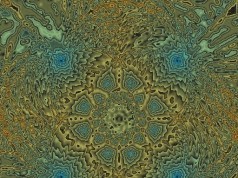Science Goes Beyond Common Sense Systematized
Some say that science destroyed our old illusions with relentless explanations:
“Geocentrism”, the illusion that the Sun turns around the Earth, is often quoted as an example:
However, geocentrism appeared only after it became clear that the Earth was a rounded sphere. That revelation came from observing the Earth’s shadow (prehistoric man has got to have think that the Earth was flat). It confirmed what looking at ships already indicated.
Soon after, by studying the shadows more carefully, the distance of the Sun was found to be at least three million kilometers. Hence, shortly after the Earth was found to be rounded, it was found that the sun was bigger than Earth, it was more natural to suppose Earth was turning around it.
Aristarchus of Samos actually proposed exactly this theory, within at most three centuries from the earliest suggestion of the geocentric theory.
So geocentrism was not common sense, and common sense displaced it nearly immediately after its creation.
So why did geocentrism triumph so long?
It is actually the establishment of political dictatorship, and the intellectual eclipse it entailed, that brought the neglect of heliocentrism. That was accentuated by the divine character of Aristotle’s physics. Aristotle, whose plutocratic political philosophy fit dictators like a glove (hence dictators loved everything Aristotle, and felt we should share the love too).
Dictators wanted We The People to believe everything about Aristotle, as if he were wisdom incarnated including his completely silly, easy to disprove, physics. (But the very fact Aristotle’s physics was stupid made it an instructive example: believe what your master tells you to believe, even, and, especially, if it looks idiotic; thus your mind shall be like that of a dog! Masters need dogs.)
Heliocentrism was reborn after Buridan, around 1320 CE, introduced inertia (Anglo-Saxons call this “Newton’s First Law”). Buridan was immensely famous, so the Church suppressed him, actively, five generations after his death.
Buridan’s work is now attributed to Copernicus. (So the Church is still winning that one!)
In truth, much common science is just common sense, systematized. A lot of what modern mechanics and aerodynamics was perfectly mastered by Genghis Khan’s archers (say). A Mongol prince hit a dummy with an arrow, in a competition, at a distance of half a mile (once).
The rise of modern mechanics came from Middle Ages gunnery, especially after the French invention of field guns around 1430. Gunners quickly found that Aristotle’s physics was wrong, and established their own empirical science.
It’s actually commodity traders anxious to know first what the ships carried who developed telescopes. Galileo perfected them later (and had a scientific fight with his friend the Pope. about tides, and Galileo was wrong.)
Did the discovery of genes change everything?
That’s what snake oil salesmen want us to believe. Read Dawkins:
“. when you are actually challenged to think of pre-Darwinian answers to the question ‘What is Man?’ ‘Is there a meaning to life?’ ‘What are we for?’, can you, as a matter of fact, think of any that are not now worthless except for their (considerable) historic interest? There is such a thing as being just plain wrong and that is what before 1859, all answers to those questions were.” (Richard Dawkins, The Selfish Gene, p. 267)
What is he saying?
That Englishman Darwin found all wisdom prior was worthless. Darwin, who thought of himself as a Lamarckian (and so did Wallace about Darwin!), would have been shocked.
The Anglo-Saxon debate about Darwin is a funny thing: in this vision, religiously propagated by Dawkins, evolution was discovered in 1859, by the British empire. (Dawkins may despise the Christian god, but he reveres the English empire.)
Why was Lamarck so hated after 1815? For the same reason that anti-Judaism was made into the law over most of German speaking Europe, at the same time.
It was the same mood: the Lord of Heavens, Jesus Christ, was back, and research professor Jean-Baptiste Lamarck’s evolution theory (which Lamarck demonstrated by studying fossilized mollusks, around 1800), which had attacked so fiercely the Christian god, was out. Teaching evolution was strictly forbidden in British universities. (Darwin turned around that, two generations later, by not being a professor.)
Britain had been allied, and used as a weapon, the anti-Judaic, anti-Slav, rapacious kingdom of Prussia, since 1756. The dirty evolutionary French theories were anathema. Especially in the Anglo-Saxon world (nevertheless, they percolated, from Darwin, to Lyell.)
But did not science’s evolution theory, Lamarckian or not, debase man, by showing man was just an animal?
No. British universities forbid the teaching of Lamarck for two generations because evolution theory debased Christianity, which says god looks like man. Thus, god was a monkey, or dog. But that would not have shocked Indians, just stiff upper lip Brit, whose empire depended upon smooth sailing between sovereign and force.
Most of the 10,000 religions or so that we know, did not make a distinction between the human and animal realms. Many saw a continuity, a complicity, a coming and going between beasts, men, and gods, with various transmutations.
Evolution was known, de facto, for millennia:
Even prehistoric dogs, 35,000 years old, were obtained with heavy breeding from wolves (they did not look like wolves at all). Xenophon and Macedonians, obsessed by the breeding of horses, knew perfectly well that artificial selection worked.
So science is very far from having “de-legitimized” all of the preceding theories. And some of these theories seemed most likely even tens of thousands of years ago: a discipline such as ethology had to be well mastered, for prehistoric man to survive, let alone thrive. Practice often primes theory (even Heidegger guessed that one).
The latter point is particularly true in mathematics, where detailed examples suggest general theories.
Physics and biology confirm, systematize much of what men have observed, ever since there are men, and they think. Many phenomena are simply better observed, and understood.
So nothing is new under the sun?
Not quite. What science brought that’s really new, like neurons, or Quantum Physics, if anything, has made the world into an ever more complex, mysterious, magical place.
The more we see, thanks to science, the more beautiful, and complex, it gets. Who needs gods, when we have what we found?
Patrice Ayme





